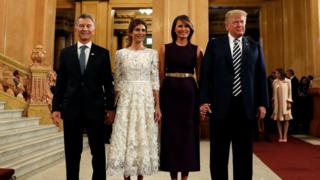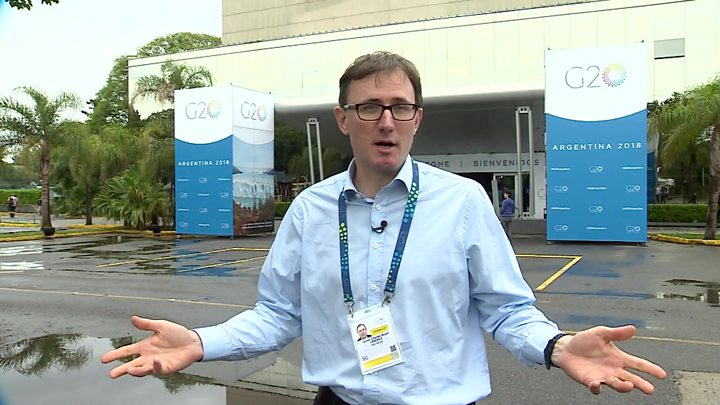 Image copyright
Reuters
Image copyright
Reuters
Donald Trump is to meet China's President Xi Jinping after the G20 summit in their first talks since a trade war erupted earlier this year.
Mr Trump said he hoped they would reach a deal during their dinner in Buenos Aires to defuse trade disagreements and said he believed Beijing wanted this.
A Chinese official meanwhile said "consensus is steadily increasing" but differences remained.
Both sides have imposed tariffs on billions of dollars' worth of goods.
On Friday Mr Trump briefly met Russian President Vladimir Putin on the sidelines of the G20, a Russian official told Reuters.
Earlier the US president said he had postponed a planned press conference "out of respect for the Bush family", following the death of former President George HW Bush, at the age of 94.
During the G20, emerging economies denounced protectionism.
Chile's President Sebastián Piñera told the BBC he hoped for a deal to end what he called "this nonsense of a tariff war".
However the US trade representative, Robert Lighthizer, said he would be surprised if Mr Trump's working dinner with Mr Xi "wasn't a success".
Meanwhile Wang Xiaolong, director general of the Foreign Ministry's department of international economic affairs, said negotiations between Chinese and US officials were making some progress.
The US has hit $250bn of Chinese goods with tariffs since July, and China has retaliated by imposing duties on $110bn of US products.
Earlier this month the Trump administration accused China of not changing its "unfair" practices.
Beijing meanwhile has accused the US of starting "the largest trade war in economic history".
US-China trade divisions also meant an Asian economic summit earlier this month was unable to agree a formal leaders' statement for the first time in its history.

During the Asia-Pacific Economic Cooperation (Apec) summit, Mr Xi took a swipe at the US's America First policy by saying that countries that embraced protectionism were "doomed to failure".
Ahead of the G20 Mr Trump told US media he expected to go ahead with plans to raise tariffs on $200bn of Chinese goods - first introduced in September - to 25% (up from 10%) starting in January 2019.
Mr Trump also said that if talks were unsuccessful, he would carry out a threat to hit the remaining $267bn of annual Chinese exports to the US with tariffs of 10-25%.